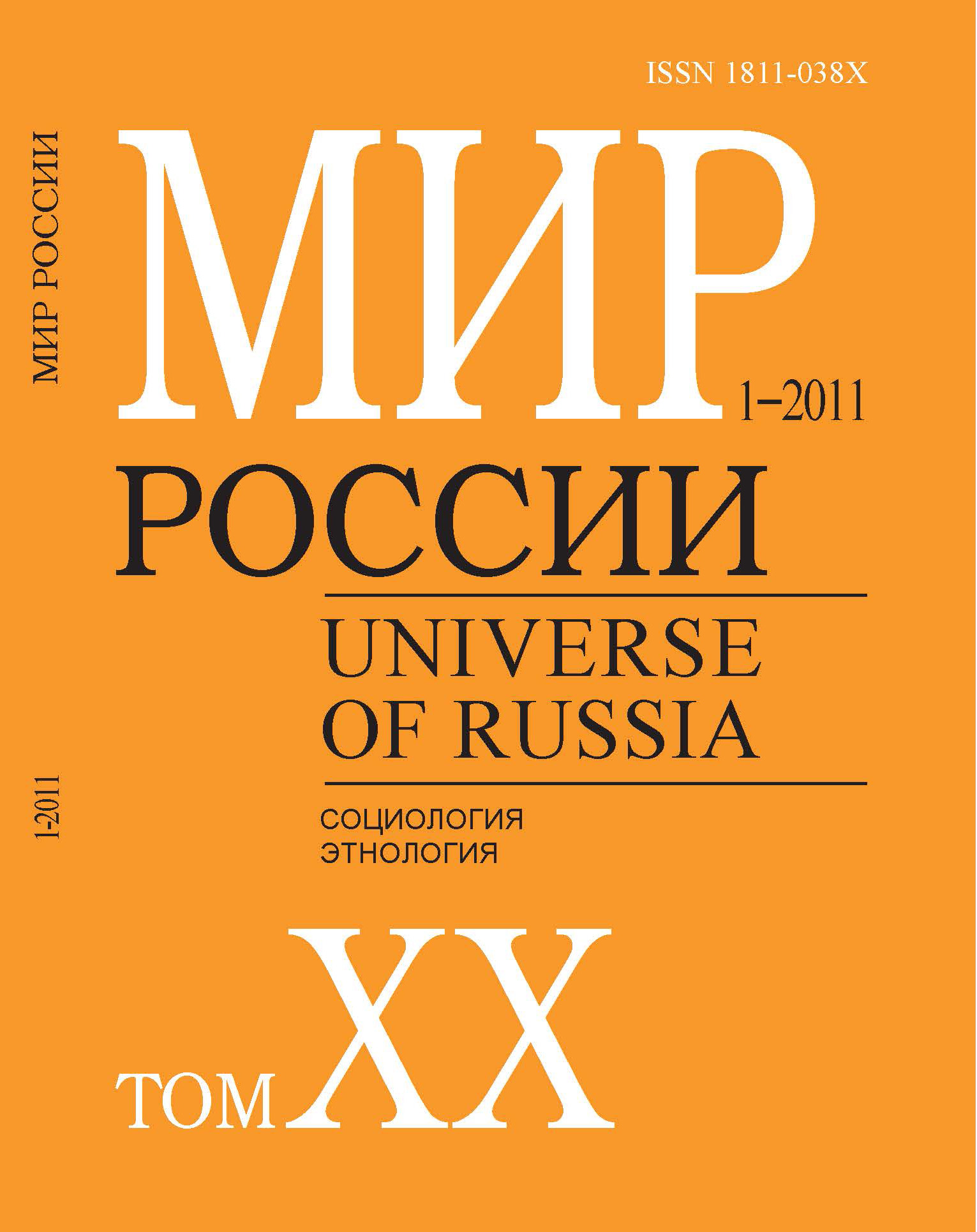Russian Province and its Inhabitants (a case of observation and its tentative description)
Abstract
Simon Kordonsky — Head of the Department of Local Administration, National Research University “Higher School of Economics”. Address: 20, Myasnitskaya St., Moscow, 101000, Russian Federation. E-mail: kordonsky@gmail.com
Yuri Plusnin — Deputy Dean, Faculty of State and Municipal Government, National Research University “Higher School of Economics”. Address: 20, Myasnitskaya St., Moscow, 101000, Russian Federation. E-mail: jplusnin@hse.ru
Yulia Krasheninnikova — Expert, Foundation for Social Research Support “Khamovniki”, National Research University “Higher School of Economics”. Address: 20, Myasnitskaya St., Moscow, 101000, Russian Federation. E-mail: decrua@mail.ru
Anor Tukaeva — Expert, Foundation for Social Research Support “Khamovniki”, National Research University “Higher School of Economics”. Address: 20, Myasnitskaya St., Moscow, 101000, Russian Federation. E-mail: atukaeva@hse.ru
Oksana Morgunova — Expert, Foundation for Social Research Support “Khamovniki”, National Research University “Higher School of Economics”. Address: 20, Myasnitskaya St., Moscow, 101000, Russian Federation. E-mail: omorgunova@hse.ru
Dinar Akhunov — Expert, Foundation for Social Research Support “Khamovniki”, National Research University “Higher School of Economics”. Address: 20, Myasnitskaya St., Moscow, 101000, Russian Federation. E-mail: ahunovdinar@gmail.com
Denis Boykov — Expert, Foundation for Social Research Support “Khamovniki”, National Research University “Higher School of Economics”. Address: 20, Myasnitskaya St., Moscow, 101000, Russian Federation. E-mail: denis.boykov@gmail.com
One of the key problems in understanding contemporary Russia’s development, in our opinion, is the lack of the non-judgmental knowledge about the life of the population and management processes at the local level. It can, however, be resolved through unbiased observation and descriptive studies based on the non-theoretical schema description. We have been conducting such studies over the last 5 years (42 expeditions in about 80 settlements, primarily towns).
This article attempts to describe the life of contemporary provincial Russia from three aspects: (1) territorial, administrative and economic organization of space, (2) social structure and lifestyles of the local population, and (3) the structure of local government and power relations.
A preliminary ’snapshot’ of activities in a local society shows that the real organization of life is a lot more multifold than the one that exists in formal classifications and schemes developed by sociologists and used by officials. As a result of the non-compliance between schemes and reality, any reform imposed from above is either being neutralized or adapted on a local level to the realities of the local government and population. However, such neutralization processes are usually invisible if we consider the official information (i.e. municipal statistics or local opinion surveys).
We reveal the problem of inconsistency between the municipal status of settlements (urban or rural) and their historically determined social weight. The lack of sustainability in municipal structures is a lot more evident in the case with urban districts — their administrative and territorial status is still quite amorphous. Municipal differences in social and economic characteristics and their development prospects are determined by their access to different resources, including the latent ones (i.e. seasonal work, illegal small businesses, etc.) which can only be revealed through participant observation. According to this principle two settlement types can be distinguished: developing and escheated ones.
Within the social structure of settlements, several isolated groups can be distinguished. These are the groups of ‘indigenous’ settlers, seasonal cottagers and landowners, and seasonal workers. At the same time, the social differentiation is based primarily on status differences (‘people’ and ‘elites’) rather than economic resources. The most common form of structuring local elites is a so-called ‘civil society of public servants’ — an informal community of people with relatively similar statuses, able to affect the decision-making in local governments.
Our research has shown that many common perceptions of the lifestyles of people in provincial Russia (poverty, alcoholism, total corruption, religiosity, etc.) are mythical. Yet mythical as well are the dominant perceptions of the exclusive state healthcare system and the generally accessible education.
The structure of local government and power relations is also rather versatile. Along with the less numerous examples of (1) the real municipal self-governance and (2) politicized municipalities keeping the balance of interests, more common are the following two types: (3) municipalities which have practically turned into manors of local entrepreneurs and municipal officials, and (4) municipalities with officials who support the Soviet structure of government.
At the same time different strategies of the local government can be distinguished with respect to their relation to the voting population. The first strategy is biased towards those who are in desperate need of social support (pensioners, budget workers, lower officials). The second strategy is based on ‘insider interactions’ with those whom the government officials do business with or provide with possibility of doing business for a certain rent or bribe (seasonal workers, entrepreneurs). In many settlements there has formed a so-called administrative business, which makes income on various compensations from entrepreneurs. Thus, the official political and public activity in settlements is mostly imitational. The real local politics are basically a reflection of a struggle for resources.






